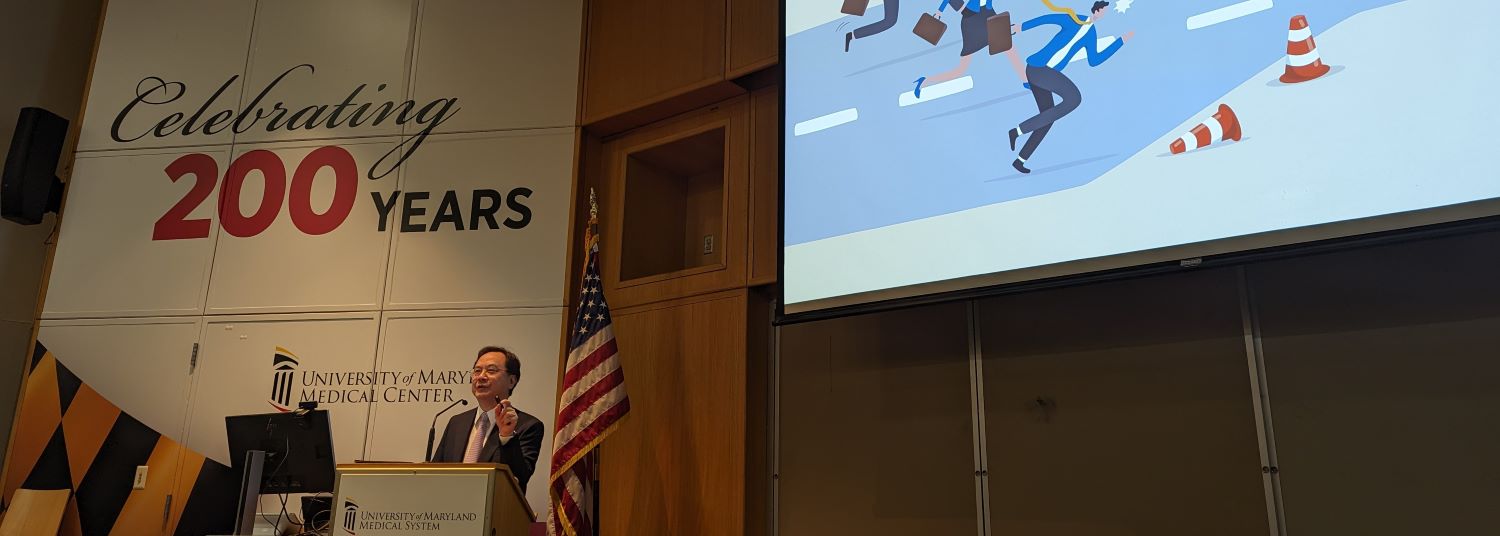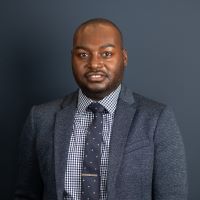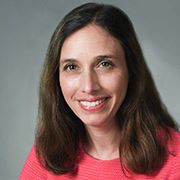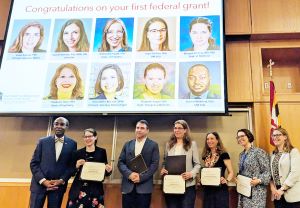 On Friday, May 17, CARTI and the UMSOM Department of Obstetrics, Gynecology and Reproductive Sciences teamed up to host its inaugural distinguished lecture series, featuring Professor Yuk-Ming Dennis Lo of The Chinese University of Hong Kong. To kick off the event, Marey Shriver and E. Albert Reece first recognized researchers who have participated in CARTI training in the last two years who have successfully garnered federal funding.
On Friday, May 17, CARTI and the UMSOM Department of Obstetrics, Gynecology and Reproductive Sciences teamed up to host its inaugural distinguished lecture series, featuring Professor Yuk-Ming Dennis Lo of The Chinese University of Hong Kong. To kick off the event, Marey Shriver and E. Albert Reece first recognized researchers who have participated in CARTI training in the last two years who have successfully garnered federal funding.
“It can be quite challenging for a nascent research project or program to gain traction among the many competing priorities that faculty members face, including teaching, administrative responsibilities, clinical duties, among others,” said E. Albert Reece, the Distinguished University and Endowed Professor and Director of CARTI.
Of course, securing funding is critical for launching a research program. However, according to NIH Data Book the grant success rate over the last two years has stayed around 21%, down from a high of over 30% around the year 2000. Even accounting for Early Stage Investigator status in the review process, this still presents significant challenges for new-ish faculty members.
This is why CARTI exists: to provide hundreds of hours of programming each year to help researchers gain the skills needed for successful careers. “In addition to CARTI’s seminars and consultations, we offer a few intensive grant writing courses to help people get their draft applications into a good position for submission, but success still depends on the proposed research, the study section and a whole host of other variables,” says Marey Shriver, Executive Director for Faculty Development at CARTI.
 Darren Whitfield, an associate professor at the UM School of Social Work, enrolled in the R01 class with Christy Chang. “I would encourage more folks to take the R01 writing course, the group review process and [Christy’s] individual feedback was invaluable to me.” Whitfield’s research examines how intersectional identity impacts psychosocial and structural factors associated with health outcomes of LGBTQ communities of color. When he received notice of being funded, Whitfield was in total disbelief. “I had heard that most people don’t get funded on their first submission, and I knew the payline was really compressed, so I wasn’t expecting to be funded. I was hoping to get a decent score for resubmission.”
Darren Whitfield, an associate professor at the UM School of Social Work, enrolled in the R01 class with Christy Chang. “I would encourage more folks to take the R01 writing course, the group review process and [Christy’s] individual feedback was invaluable to me.” Whitfield’s research examines how intersectional identity impacts psychosocial and structural factors associated with health outcomes of LGBTQ communities of color. When he received notice of being funded, Whitfield was in total disbelief. “I had heard that most people don’t get funded on their first submission, and I knew the payline was really compressed, so I wasn’t expecting to be funded. I was hoping to get a decent score for resubmission.”
UM School of N ursing assistant professor Rachel Breman had a similar experience when she received notification of funding. “I was in complete disbelief and shock,” says Breman, whose research aims at improving care for individuals throughout pregnancy, labor and birth by improving communication and shared decision making. Breman had previously secured a UMB ICTR/CTSA mentored career development (KL2) award and she participated in CARTI’s “K Club” and Chang’s R01 class. “ For me it was the support from the grant writing courses, CARTI is a vital resource for faculty who want to develop a research program,” says Breman. “Having the KL2 grant was immensely helpful so that I could conduct my research and publish the findings to support my CV.”
ursing assistant professor Rachel Breman had a similar experience when she received notification of funding. “I was in complete disbelief and shock,” says Breman, whose research aims at improving care for individuals throughout pregnancy, labor and birth by improving communication and shared decision making. Breman had previously secured a UMB ICTR/CTSA mentored career development (KL2) award and she participated in CARTI’s “K Club” and Chang’s R01 class. “ For me it was the support from the grant writing courses, CARTI is a vital resource for faculty who want to develop a research program,” says Breman. “Having the KL2 grant was immensely helpful so that I could conduct my research and publish the findings to support my CV.”
Other researchers recognized include:
- Galya Bigman, US Dept. Veterans Affairs
- Andrea Buchwald, UMSOM, Pediatrics
- Joyce Teixeira Da Silva, UMSOD
- Meagan Deming, UMSOM, Medicine
- Stephanie Hare, UMSOM, Psychiatry
- Haley Miles-McLean, US Dept. Veterans Affairs and UMSOM, Psychiatry
- Elizabeth Powell, Emergency Medicine
The guest speaker, Professor Dennis Lo, relayed his own experience lacking the funding to do the research that he launched as a medical student, looking for less invasive methods of assessing fetal health during pregnancy. Professor Lo had surmised that if the fetus releases cells during development, it could be possible to detect cells containing a Y chromosome from a maternal blood draw. Sharing a photo of himself bundled head-to-toe in personal protective equipment so as not to contaminate his samples, Professor Lo also shared his in situ hybridization data revealing the presence of Y-chromosomes from a male fetus in a maternal blood sample. At that point, however, he ran out of funding, and had to return to the clinic.
However, Professor Lo felt the responsibility to continue this research and develop a minimally-invasive diagnostic test. After finishing medical school, Professor Lo returned to the bench to continue his work, but he was unable to collect enough fetal cells from the blood samples. Through tales of his dislike of English food, and his fallback meal of ramen noodles, he realized there is enough cell free DNA in plasma for reliable diagnosis, which led to the development of what today is known as NIPS/NIPT, or non-invasive prenatal screening/testing for Down syndrome and other chromosome-based disorders.
Professor Lo was honored for his discovery with the 2022 Lasker-DeBakey Clinical Medical Research Award. The path from discovery to award was not at all straightforward. Professor Lo tells how he was nearly scooped—several times—was laughed at by peers for a cancer-related idea that came to fruition 20 years later, and for years was mired in legal proceedings over intellectual property. Yet he continued to follow science, to ask the questions and pursue his passion.
“We have launched this annual lecture series with a specific purpose of illustrating that challenges in research are normal, and indeed common. Developing a certain resilience and perseverance can lead one to great success over time,” said E. Albert Reece.
